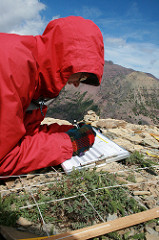Teacher as scientist
By Mary Bigelow
Posted on 2016-11-30
 I have a degree in biology and teach high school. Although I love teaching at this level, I miss doing real scientific work myself. Any suggestions on how I can still stay engaged and current in science? —T., Illinois
I have a degree in biology and teach high school. Although I love teaching at this level, I miss doing real scientific work myself. Any suggestions on how I can still stay engaged and current in science? —T., Illinois
Although we teach a variety of topics, teachers have areas of special interests. And as we teach unfamiliar topics, we may discover new interests. Social media is a good way to find out more about ways to continue and expand on your interests. Some options you could explore include:
- Participating in programs from universities or government agencies that help teachers contribute to investigations over the summer and to partner with researchers. Your alma mater or a nearby college/university may have such a program.
- Attending programs and presentations at universities, museums, medical centers, parks, or science centers to update your knowledge and foster connections with researchers and other science professionals.
- Volunteering your expertise and expertise at nature centers or museums.
- Inviting scientists to your classroom to share their experiences and expertise and perhaps work with your students. Some science partnership projects with higher education facilitate these interactions.
- Reading science journals and publications, many of which are available online. Share with your students.
- Using summer and term breaks to visit museums, science centers, national parks, and so on. If you let the staff know ahead of time you’re a teacher, you may get the red carpet treatment with an in-depth or behind-the-scenes tour.
- Contributing to continuing investigations through citizen science projects (see the SciStarter website for projects in which both you and your students can participate)
As science teachers, we have an obligation to model lifelong learning for our students. And they enjoy finding out about our “secret” lives and interests and passions.

